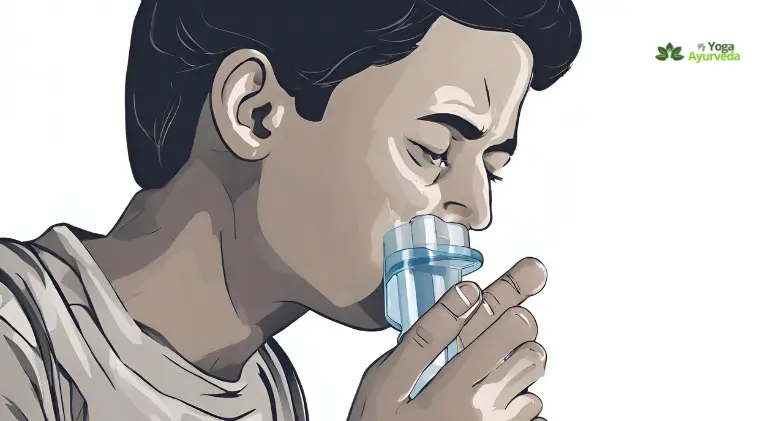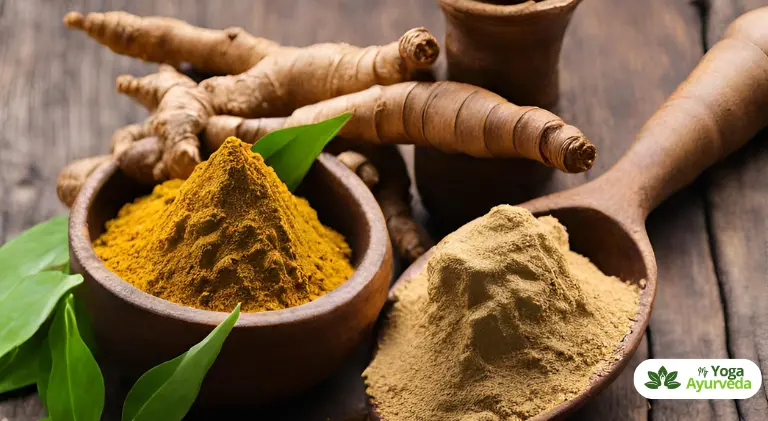
Written by Yoga Mentor Keshav, with facts sourced from Ancient Indian Ayurvedic and Yogic Textbooks, as well as scientific research.
Asthma is a chronic respiratory disorder that affects the airways, causing inflammation and narrowing of the bronchial tubes, resulting in difficulty in breathing. Ayurveda, an ancient system of medicine from India, offers holistic and natural approaches to managing asthma symptoms and improving overall respiratory health.
Natural ways of managing Asthama is helpful. Ayurveda has several home remedies, these are effective and used for many years. Here are some Ayurvedic home remedy for asthma.
The symptoms of asthma can vary from person to person and can range from mild to severe. Some common symptoms of asthma include:

ऊर्ध्वश्वासः कफजनितो भवति श्वासावरोधकारकः श्वासकष्टः कफप्रकोपोऽस्ति तस्मात्कफं शमयेत्
Urddhvasvasah kaphajanihto bhavati śvāsavarodhakārakaḥ śvāskashṭaḥ kaphaprokopo’sti tasmātkaphaṁ śamayet
Translation:
Charak Samhita says : Asthma is caused by Kapha and causes obstruction in breathing. Breathing difficulty is a sign of Kapha aggravation, so Kapha should be pacified.
This sloka describes the Ayurvedic understanding of asthma as a Kapha-related disorder. It highlights the importance of pacifying Kapha to alleviate asthma symptoms.
In Ayurveda, an imbalance in the Kapha dosha is believed to be the root cause of asthma, originating primarily in the stomach and subsequently affecting the lungs, trachea, and bronchi.
The natural flow of air is disrupted by this elevated Kapha, leading to the initiation of spasms in the bronchial tree and the manifestation of asthma symptoms like wheezing.
Aside from the Ayurvedic perspective, asthma can also be triggered by various factors such as allergies, cold, congestion, cough, or hay fever. Asthma symptoms may be induced by external elements like pollen, dust, animal hair, certain foods, or an internal increase in Kapha.
The Ayurvedic approach to asthma centers around the restoration of balance to the Kapha dosha.
The primary goal is to guide the accumulated Kapha from the lungs and bronchi back to the stomach, where it can be effectively eliminated.
These 5 Ayurvedic Medicines for Asthma will make your breath easy. They are proven home remedies of ayurvedic medicines which have been used by many patients of asthma and wheezing.
| Ayurvedic Herbs (Mix) | Benefits |
|---|---|
| Haridra (Turmeric) and Ginger Water | Anti-inflammatory, improves respiratory health |
| Trikatu | Anti-inflammatory, relieves bronchial spasms |
| Warming Herbal Tea | Reduces airway congestion, clears mucus |
| Sitopladi and Punarnava | Reduces cough, relieves congestion in bronchial tubes |
| Licorice (Mulethi) and Ginger Tea | Anti-inflammatory, soothes respiratory tract |
Haridra, commonly known as turmeric, is a potent anti-inflammatory herb. It helps in reducing inflammation in the airways, alleviating symptoms of asthma, and improving overall respiratory health. When it is used with Ginger it becomes miracle water.
Ingredients and Doses:
This is Ayurvedic Secret : Turmeric and Ginger Water helps to balance Kapha dosha.
It is a combination of three spices – dry ginger (sonth or shunthi) , black pepper, and pipali or long pepper – is an effective combination in Ayurvedic medicine.

Its anti-inflammatory and antispasmodic properties help reduce airway inflammation and relax bronchial muscles, easing breathing difficulties associated with asthma.
Ingredients and Doses:
Additional Option:
How Trikatu Helps for Overall Health.
A warm herbal tea made with cinnamon, clove, and ginger offers a comforting and effective remedy for asthma.
Simple Recipe of Winter Herbal Tea
Ingredients:
Doses:
This is a good option for tea lovers. You can replace with tea with milk tea.
These spices help reduce airway congestion, clear mucus buildup, and enhance respiratory function.
Sitopladi, Punarnava, Pippali, and Abhrak Bhasma are significant elements in traditional Ayurvedic medicine, each renowned for its unique properties and contributions to holistic health.
Sitopaladi Churna is a classical Ayurvedic formulation widely used in respiratory disorders, including asthma. It consists of herbs like Pippali (long pepper), Vamsalochana (bamboo manna), Ela (cardamom), and Tvak (cinnamon).
Sitopaladi Churna helps in reducing cough, improving respiratory function, and relieving congestion in the bronchial tube
A preparation made with these ayurvedic herbs is good for both prevention and immediate relief.
How to make Herbal formula for Asthma
Ingredients:
Doses:
Yastimadhu, Mulethi or licorice root, is a well-known Ayurvedic remedy for respiratory ailments. Its anti-inflammatory and demulcent properties help soothe the respiratory tract, reduce inflammation, and promote expectoration of mucus. Evidence
Ginger, with its anti-inflammatory and antioxidant properties, further enhances the efficacy of this tea.
How to make Licorice (Mulethi) and Ginger Tea
Ingredients
Doses:
Tea made with Licorice and Ginger (adrak) is beneficial for asthma prevention.
If you have Infection : A potential cause of wheezing in certain individuals could be an infection originating from the nose and sinuses. In such instances, applying 5-10 drops of lukewarm cow ghee in each nostril provide relief.
Try to Avoid Allergens : If a food allergy is present, the problematic food should be avoided. Similarly, any objects that might trigger the condition, such as dusty books, dust on roads, or chemicals, should be avoided. It is important to do regular health checkup to find out any food allergy you have. Full body health checkup @ 699 only.
Avoid Indoor dampness, humidity and moist Places : It is also bad for asthmatic person. One of the environmental factors most commonly associated with respiratory disease is building dampness. It is better to avoid these places. Evidence.
Foods to Avoid in Asthma: The importance of maintaining a healthy diet in managing asthma is emphasized by Ayurveda. To prevent the formation of mucus and congestion in the respiratory tract, it is recommended to steer clear of heavy, oily, and cold foods.
The consumption of most dairy products, including all cheeses, fermented foods, and hydrophilic substances like salty items, cucumber, and tuna fish should be avoided. Additionally, some individuals may need to refrain from foods that trigger allergies, such as mushrooms, peanuts, walnuts, and other nuts, as well as yeast.
Final Words : Consuming warm, light, and easily digestible foods, such as soups, cooked vegetables, and ginger tea, can help alleviate asthma symptoms.
Meet Shri Rajkumar Agrawal, aged 47 years of age.
Rajkumar Agrawal is asthmatic for more than 5 years. After joining My Yoga Ayurveda he has managed his asthma and wheezing very well.
Meet Mrs Pratibha Soni aged 52 years of age.
Mrs Pratibha Soni is also having wheezing and asthmatic problem for more than 5 years. After joining My Yoga Ayurveda he has managed his asthma and wheezing very well.
These five Ayurvedic medicines, when used as part of a comprehensive Ayurvedic treatment plan, can significantly improve asthma symptoms, enhance respiratory function, and promote overall well-being.
This breathing exercise will help you in Asthma and Wheezing.
It’s important to consult with an experienced Ayurvedic practitioner to determine the most suitable combination of remedies and dosages for your individual needs.
What are the common symptoms of asthma?
Common symptoms of asthma include wheezing, shortness of breath, chest tightness, coughing, and difficulty sleeping due to coughing or wheezing.
What causes asthma from an Ayurvedic perspective?
In Ayurveda, an imbalance in the Kapha dosha, originating primarily in the stomach and affecting the lungs, trachea, and bronchi, is believed to be the root cause of asthma.
How does Ayurveda approach the treatment of asthma?
Ayurvedic treatment for asthma focuses on restoring balance to the Kapha dosha, guiding accumulated Kapha from the lungs and bronchi back to the stomach for effective elimination.
What are some Ayurvedic medicines for asthma?
Five Ayurvedic medicines for asthma include Haridra and Ginger Water, Trikatu, Warming Herbal Tea, Sitopladi and Punarnava, and Licorice (Mulethi) and Ginger Tea.
How can Ayurveda help manage asthma symptoms?
Ayurveda provides holistic and natural approaches to managing asthma symptoms by addressing the root cause and promoting overall respiratory health.
Are there dietary recommendations for asthma in Ayurveda?
Ayurveda suggests avoiding heavy, oily, and cold foods to prevent mucus formation and congestion. Certain dairy products, fermented foods, and hydrophilic substances should also be avoided.
Can Ayurvedic medicines be used alongside conventional asthma treatments?
It’s crucial to consult with healthcare professionals before integrating Ayurvedic medicines with conventional treatments to ensure a safe and effective approach.


